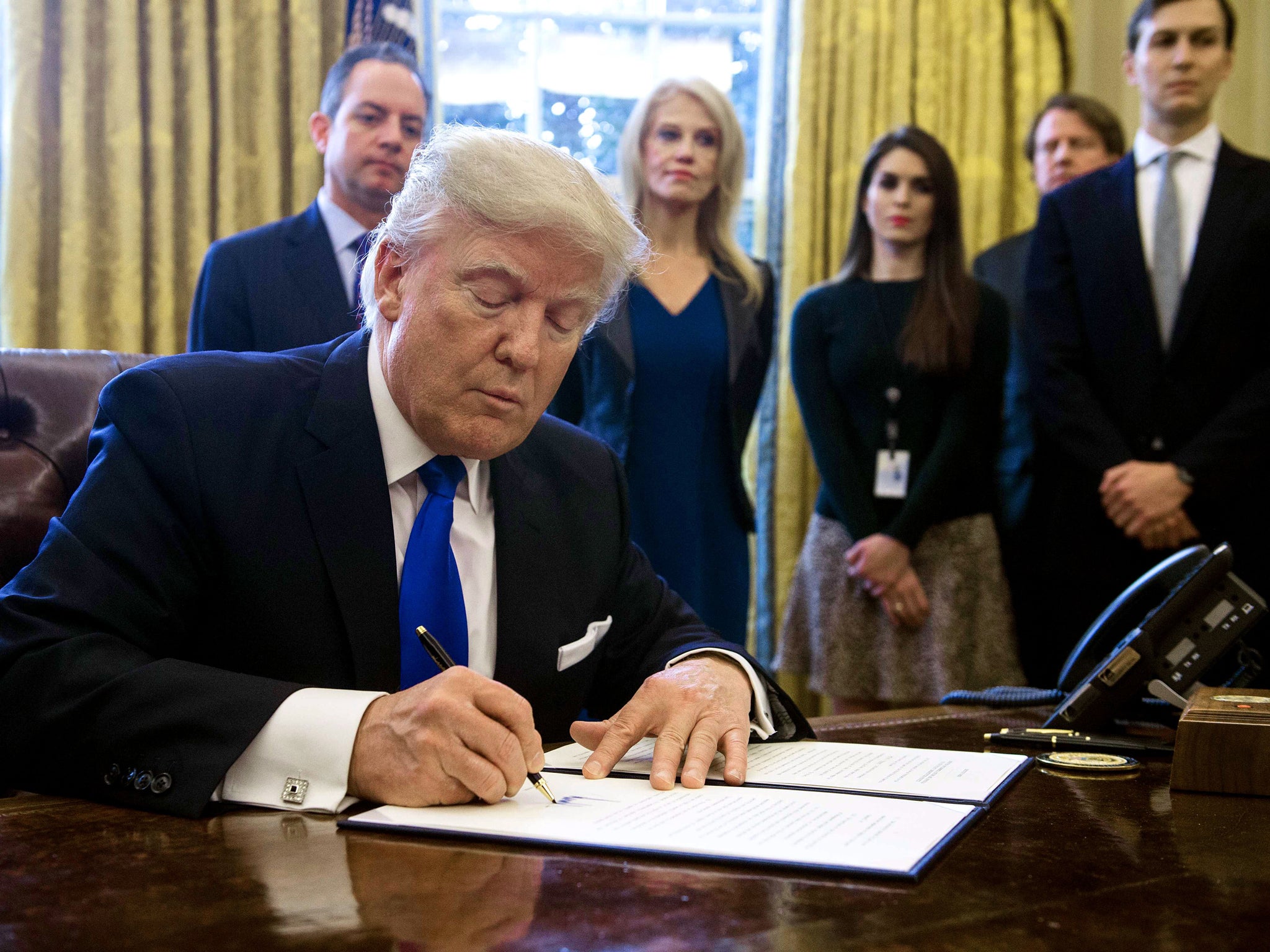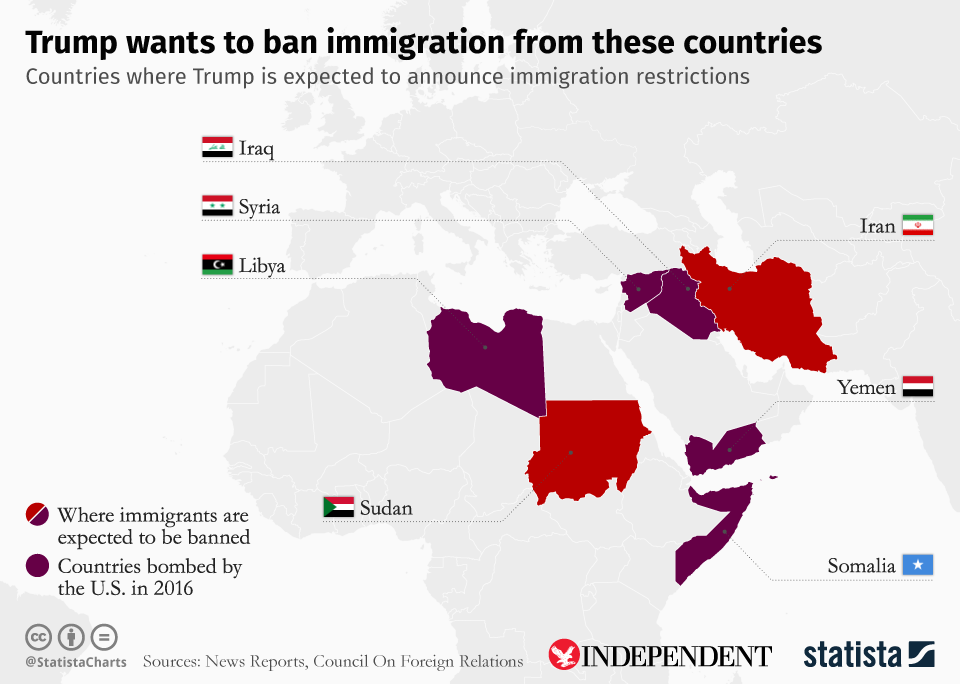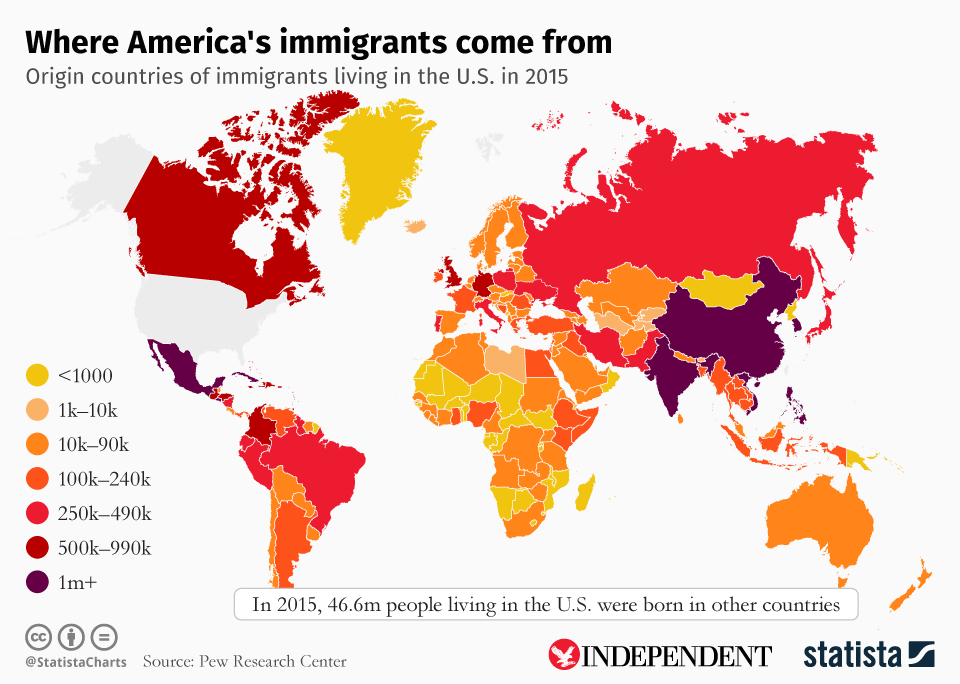President Donald Trump is bombing four of the seven countries from where he's restricting immigration
Plans for new executive orders are latest in string of the decrees

Your support helps us to tell the story
From reproductive rights to climate change to Big Tech, The Independent is on the ground when the story is developing. Whether it's investigating the financials of Elon Musk's pro-Trump PAC or producing our latest documentary, 'The A Word', which shines a light on the American women fighting for reproductive rights, we know how important it is to parse out the facts from the messaging.
At such a critical moment in US history, we need reporters on the ground. Your donation allows us to keep sending journalists to speak to both sides of the story.
The Independent is trusted by Americans across the entire political spectrum. And unlike many other quality news outlets, we choose not to lock Americans out of our reporting and analysis with paywalls. We believe quality journalism should be available to everyone, paid for by those who can afford it.
Your support makes all the difference.President Donald Trump is expected to restrict the issuing of visas to people from seven Middle East and north African countries—of which his military is currently bombing four, as shown in these infographics created by Statista.
Mr Trump tweeted he was planning a "big day" on national security matters on Wednesday and is also thought to be preparing to ban Syrian refugees from entering the US, until the State and Homeland Security departments finalise a new, stricter vetting process.
Countries subject to the temporary visa restrictions are said to be Iraq, Syria, Libya, Yemen, Iran, Sudan and Somalia. The US military is fighting Isis terrorists in the first four states, and carried out an airstrike in Somalia as recently as September last year.
Nihad Awad, the national executive director at the Council on American-Islamic Relations, condemned the initial media reports of President Trump’s immigration orders.
"These [executive orders] will not make our nation safer," he tweeted on Tuesday night, "rather they will make it more fearful and less welcoming."
Stephen Legomsky, who was chief counsel at US Citizenship and Immigration Services in the Obama administration, told Reuters the president had the authority to limit refugee admissions and the issuance of visas to specific countries if the administration determined it was in the public’s interest.
He said: "It would be exactly within his legal rights. But from a policy standpoint, it would be terrible idea because there is such an urgent humanitarian need right now for refugees."

Iraq
The US is currently trying to retake the city of Mosul from Isis. Iraqi troops, Kurdish forces and Shia militias have advanced through much of the city's east, regaining control of key local government buildings and the city’s university on Friday, but areas to the west of the river Tigris remains under Isis control.
About 1.5 million civilians were living in the city when the operation to retake it began in October, according to UN figures, and 400,000 have now been freed.
Syria
More than 100 Islamist fighters were killed by US air strikes on a training camp in Syria as American forces expanded their assault beyond Isis on Thursday.
The Department of Defence said warplanes and drones were involved the operation on the Shaykh Sulayman camp in northern Syria, on the last day of Barack Obama’s presidency.
Tens of thousands of people have been killed in the Syrian civil war and millions more have fled the country or been displaced internally amid the destruction of major cities.

Libya
US stealth bombers recently carried out strikes against Isis fighters who had fled their former stronghold of Sirte, and who officials said were plotting terror attacks against Europe.
Ashton Carter, the outgoing US defence secretary, said initial estimates suggested more than 80 fighters were killed.
Isis expanded into Libya in the chaos that followed the ouster and assassination of former dictator Muammar Gadaffi.
Yemen
The US has carried out drone strikes in the nation, aimed at al-Qaeda militants
The latest of these strikes were carried out on Friday, Saturday and Sunday, killing a handful of al Qaeda militants, according to the Pentagon.
The strikes were aimed at al-Qaeda in the Arabian Peninsula (AQAP), and were the first such strikes to take place under President Donald Trump.
The strikes, which were later confirmed by the Pentagon, did not require Trump to sign off on them. Under then-President Barack Obama, the authority to order such strikes in Yemen was devolved to the four-star commander of US Central Command, Gen. Joseph Votel.
The strikes killed five al-Qaeda operatives and took place in the town of al Bayda, according to Pentagon spokesman US Navy Capt. Jeff Davis.
Outside of US activity, the United Nations has said the civilian death toll in Yemen's nearly two-year conflict has reached 10,000, with 40,000 others wounded.
The conflict pits Shiite Houthi rebels and allied forces against a Saudi-led coalition of nations. The coalition began an air campaign in March 2015 to restore the internationally recognised government that fled the country after Houthis seized the capital.
Preparations for Mr Trump's promised border wall are also expected to get under way on Wednesday. He tweeted: "Big day planned on NATIONAL SECURITY tomorrow. Among many other things, we will build the wall!"
Join our commenting forum
Join thought-provoking conversations, follow other Independent readers and see their replies
Comments